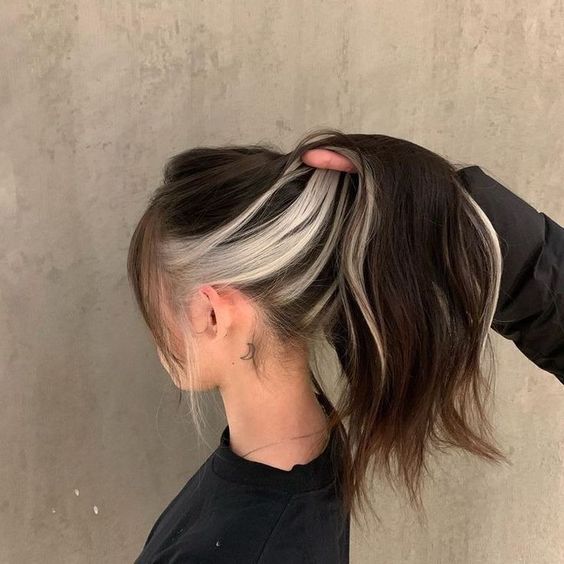
For a subtle lightening effect, bleaching wet hair works best. To get this done to your hair, however, it’s best to hire a colorist.
When applying bleach, extra care must be taken because wet hair is more delicate. Your hair will be properly dampened and bleached by a trained colorist.
Continue reading, you will learn more about bleach hair wet.
Table of Contents
Why Do Colorists Bleach Wet Hair?
There are a number of reasons why hair colorists bleach wet hair. They might do it too:
Create a Subtle Lightening Effect
If you want to gradually lighten your hair, your colorist may employ this method. The bleach is diluted by the water, which causes a slight change in color.
The bleach is also distributed evenly by the water. A softer lightning effect is produced as a result of avoiding abrupt color changes.
Achieve a Faster Application
If you want a fast coloring procedure, your colorist might use wet balayage.
The objective is to produce a subtle color change, not just because bleach reacts more quickly on wet hair. Your hair does not require prolonged exposure to bleach.
Brighten the Ends
Wet balayage is used to “boost” previously lightened ends in between coloring appointments.
After a conventional highlight session, it is also used to further brighten the ends. A colorist can add additional bleach to your hair after it has already been bleached, processed, and rinsed to enhance the result.
What Happens When You Apply Bleach to Wet Hair?
Bleaching hair has an impact on dry vs. dry hair in different ways.
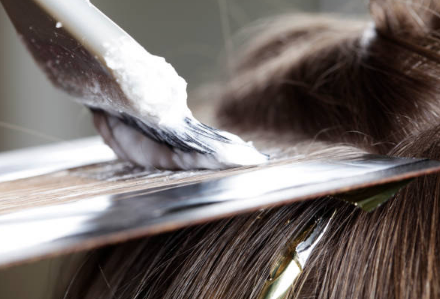
Bleach penetrates the hair cuticle when applied to dry hair. The melanin is then broken down once it reaches the cortex. Your hair will become lighter as a result of less pigment being present.
Under the cuticle, proteins are also cross-linked. Your hair’s structure is provided by these proteins. The proteins are oxidized and destroyed by bleach, weakening the hair.
The cuticle scales are already raised when your hair is wet. The cortex is easily penetrated by the bleach, and it can then degrade melanin there.
However, because the bleach is diluted with water, there isn’t much of a color change. The hair is quickly and subtly lightened by this.
Is Bleaching Wet Hair Harder on Your Hair?
There are some problems with bleaching wet hair despite how convenient it is.
Don’t Try This at Home
Avoid utilizing this method at home if at all possible. If performed improperly, it can seriously damage your hair.
Additionally, at-home coloring kits come with instructions that you should always abide by. They probably won’t involve coloring wet hair with bleach or dye.
Hair is Weakest When Wet
Your hair may experience damage from the technique. This is due to the fact that wet hair is the most fragile. The cuticle—the hard exterior covering each strand—is loosened by water. It is constructed of sheets of overlapping scales.
The cortex, the area in the middle of the hair, is typically shielded by the cuticle. Your hair’s color is produced by a pigment called melanin found in the cortex.
However, the cuticle is unable to effectively protect the cortex when it is open. This implies that the hair is more susceptible to harm.
Best to Work With a Trained Colorist
It’s best to work with a colorist when bleaching wet hair. They’ll be aware of how to employ the technique safely while safeguarding your hair.
They could, for instance, use the appropriate amount of water before bleaching. To lessen harm after bleaching, they might also use a special conditioner.
A colorist can also tell you if bleaching wet hair will give you the desired result.
When is It Okay to Bleach Wet Hair?
There are actually a number of reasons to bleach wet hair, though it’s not a common practice. Below, we’ve listed the three most frequent ones.
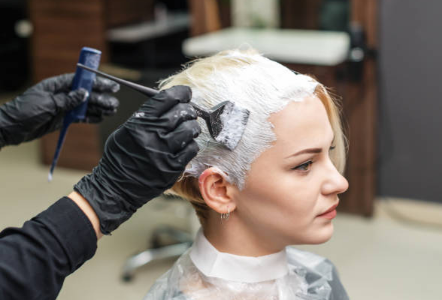
To Lighten Your Hair Faster
Wet hair actually lightens more quickly, as it turns out. Your stylist may use bleach on wet hair instead of waiting for it to dry if you’re short on time or just want a quick method of lightening.
For a Subtle Color Change
Remember that the color of your strands won’t lift as much from bleach when applied to wet hair as it would if it were applied to dry hair. This is because the water in your hair will dilute the bleach, making the results softer. Your colorist might use bleach on wet hair to subtly alter the color. It usually works best to lighten your strands with just one or two shades with this technique.
To Brighten Up Your Ends
The wet balayage technique lends itself perfectly to wet bleaching. When your hair is dry and highlighted, let the foils set up before rinsing the bleach out of your hair. To add an extra boost of subtle definition for a lovely, sun-kissed mane, add a little more bleach to your wet ends.
Can You Bleach Freshly Washed Hair?
Let’s get right to the point: yes, you can bleach wet hair. But it’s a good idea to avoid washing your hair right before a bleaching procedure, just like when you dye your hair. This is due to the fact that the natural oils in your hair can act as a barrier to protect your scalp from harm during the bleaching process.
They won’t fully wash your mane before coloring your hair if you ask your colorist to wet bleach your strands. Instead, they’ll spritz your hair with water or give it a quick rinse at the sink. Having said that, there are specific instances in which you should bleach wet hair rather than dry hair, as well as a time and place for doing so.
Should You Wash and Dry Your Hair before Coloring It?
It’s advised against washing your hair right before bleaching it. Sebum, the natural oil found in your hair, shields your scalp from damage while the process is going on. The oil will lessen hair protein loss and itchiness on the scalp.
The hair that is being lightened will only be dampened if your colorist is performing a wet balayage. Instead of shampooing every strand of your hair, they’ll probably spray some of it with water.
For a few days prior to your appointment, you’ll probably need to refrain from washing your hair. How long you should go without washing can be determined by your colorist.
What Other Best Practice Tips for Bleaching Your Hair?
There are some things you can do to protect your hair if you’re interested in bleaching it. The following advice will keep your hair from becoming dry and brittle.
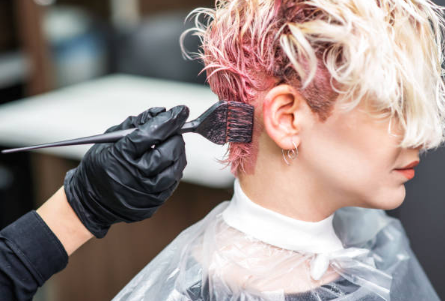
- hair conditioning treatment. In the weeks leading up to your appointment, it is advised that you deep condition your hair. By doing this, you’ll hydrate your hair before bleaching it and lower the chance of breakage.
- Cooperate with a qualified colorist. The right way to bleach hair while minimizing damage will be known by a skilled hairstylist.
- Your bleaching sessions should be few and far between. Consider spreading out your appointments. It’s among the best ways to keep from over-treating your hair.
- Don’t subject yourself to heat treatments. Bleached hair may become even more damaged when heated. It is best to avoid using heat and bleaching together as it can result in scalp burns.
- Avoid sun exposure. Avoid exposing your hair to the sun, which can cause further deterioration and breakage. Wear a hat or hair sunscreen.
- Avoid swimming in chlorinated pools. Similar to how it can cause more hair damage, swimming pool chlorine can also do this. When swimming in a pool, think about donning a swim cap.
- Inquire about recommended products from your colorist. Special products and care must be used on bleached hair. Use formulas made especially for hair that has been colored or bleached.
The Difference Between Bleaching Dry Vs Wet Hair
Generally speaking, dye won’t adhere to wet hair as well as it does to dry hair. We do not suggest bleaching damp hair if you want the best color vibrancy and dye absorption possible. Dry hair will help the dye penetrate more fully when dyed.
Wet bleaching may be required in some circumstances, but this is purely speculative and depends on the desired outcome.
Bleaching Damp Hair
As we already mentioned, bleaching on damp hair will produce a different result than bleaching on dry hair. Some of the results of bleaching on wet hair include:
- Subtle Lightening and Transitioning: Wet hair will dilute the bleach with water, making it less potent and less effective on your hair. This could be the choice to make if you prefer a more subdued color in general.
- Faster Application – Wet hair has a different structure (the cuticle is open), which allows bleach to penetrate it more quickly. This is because wet hair proteins have weaker bonds than dry ones.
Bleaching Dry Hair
When bleach is applied to dry hair, it has its full effect as opposed to being diluted when applied to wet hair. Bleach permeates the cuticle when applied to dry hair. The melanin pigments, which give your hair its dark colors, can then be broken down by the bleach by penetrating the cortex of your hair in this manner. Your hair will naturally become lighter if you reduce the amount of melanin in it. While dying dry hair can take longer than bleaching damp hair, the end result may be stronger.
Why Bleaching Wet Hair is Better
- For Quick Hair Lightening: The best option for bleaching wet hair is if you don’t have the time to spend hours sitting in a salon chair.
- For A Soft Hair Color: Do you want to give your mane some subtle lift and volume? Hairstylists frequently employ this method to give you a hair color that is one or two shades lighter: bleach your hair while it is still wet.
- For Frizz-Free Hair: The cortex and cuticle of the hair are protected by wet bleaching. By doing this, the hair is kept from drying out and becoming frizzy.
- For Bright Hair Ends: This year, lighter or brighter hair ends are a major hair trend. Bleaching the ends of wet hair gives off this futuristic appearance. The hair gets a lighter touch as a result. On short hair, it looks particularly fantastic.
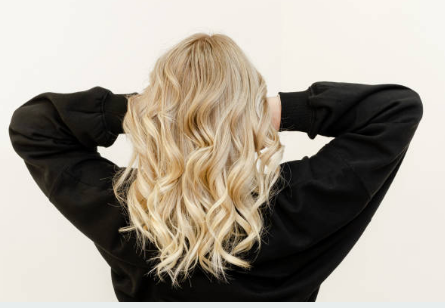
Should You Bleach Wet Hair at Home?
As you gain more experience with this hair coloring technique, you might be tempted to try this lightening technique at home. However, scheduling a salon appointment is your best option before grabbing the bleach. Wet hair is the most fragile, so if bleaching isn’t done correctly, it could seriously harm your hair. If bleaching wet hair is the best method to achieve your desired look, or if another lightening method would be preferable, your colorist will know.
Can You Bleach Hair After Washing it?
It is not suggested to bleach your hair after a wash. Before bleaching, experts mist the hair strands with a spray. This is due to the weaker nature of hair that has been wet from roots to ends. A protective barrier’s natural oils are also removed when you wash your hair. Consequently, bleaching your hair immediately after washing may increase the risk of damage and irritation to your scalp and hair.
FAQ About Bleach Hair Wet
How Can I Speed Up the Process of Bleaching My Hair?
You can hasten the bleaching process by blow-drying your hair. It is not advised because it also causes more hair damage.
Should You Bleach Dirty Hair?
Yes, it is advised to bleach your hair when it is oily and dirty because the natural oils help shield your hair and scalp from chemical deterioration.
Before bleaching my hair, should I apply coconut oil?
In order to avoid the typical burning and itching that comes with bleaching, coconut oil can be applied beforehand. The hair proteins are also safeguarded by it.
Does Foil Help in Bleaching Hair?
The bleach can be kept from drying up by using foil. Along the way, it aids in separating the various hair sections.
Conclusion on Bleach Hair Wet
Simply put, the answer is YES! HOW is the REAL query?
We all know that when hair is wet, it is most prone to breaking, frazzling, and splitting all at once.
Your hair is bleached by lifting its natural pigmentation and then adding a new color to it. As long as you are aware of a few crucial bleaching principles, this procedure can be carried out safely.